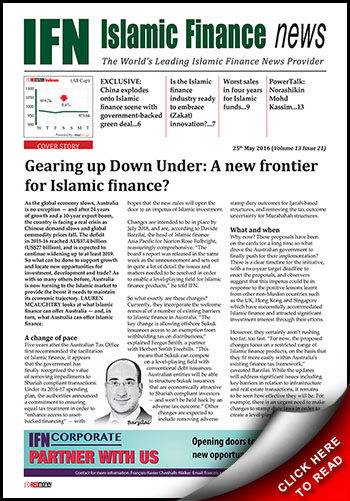25th
May 2015 (Volume 12 Issue
21)
|
||||||||||||||||||||||||||||||||||
Embracing the
opportunity
Islamic finance is not only about making a profit but about doing so in an ethical manner. Often the sectors that are less lucrative can get ignored or lose interest - but financial inclusion is relevant for everyone and supporting the unbanked can only have a positive effect on the global economy. As the G20 this year concluded: financial access and financial stability go hand in hand, and those of us privileged enough to benefit have a duty to pass on our advantage to the less fortunate. On that subject, our cover story this week explores the encouraging steps forward taken in Islamic microfinance - and looks at what more is needed to bring it forward. Our IFN reports cover education as an asset class and Iran’s potential in Islamic finance, while our analyses this week are on secondary markets and South Africa. Our correspondents bring you news from Egypt and Indonesia and our special reports are on free zones, Pakistan’s derivatives regulatory landscape, the global real estate market by IdealRatings as well as environmental, social and corporate governance principles from the International Shari’ah Research Academy for Islamic Finance in addition to a feature report on China by Franco-American Alliance for Islamic finance. As we get ready for our flagship IFN Asia event in Kuala Lumpur this week, we look forward to seeing many of you in person and discussing the opportunities and challenges that continue to face the industry. It is exciting times in the financial markets, and we are honored and grateful to host so many illustrious names in pursuit of a common goal. Cover Story
Engine of
growth: New innovations in Islamic microfinance
In an industry rapidly moving towards the mainstream and with a burgeoning capital market attracting even non-Muslim sovereigns to the table, the tale of microfinance and social inclusion may not be the sexiest or most commercially seductive of stories. But despite its lack of newspaper inches or noisy success, the sector has been quietly growing its own capabilities: struggling to face challenges not only of sustainability and size but coordination, collaboration and creativity. This week, LAUREN MCAUGHTRY meets the unsung stepchild of the Islamic finance industry — and looks at how the sector can be brought closer into the family fold. IFN Reports
IFN Sector Correspondents
IFN Country Analysis
IFN Sector Analysis
Case Study
Vodafone Qatar’s
conversion – the first non-finance company in the region to go compliant
Vodafone Qatar in 2014 revealed plans to become 100% Shariah compliant in its operations. Receiving good market response, the company’s stock price increased 20% immediately following the announcement. Employing a Wakalah structure for the arrangement, the telecommunications company successfully completed its conversion in February 2015. Speaking with Steve Walters, CFO of Vodafone Qatar, NABILAH ANNUAR has exclusive details of this historical transaction Special Reports
Free Zones in
the GCC drive deepening of Islamic financial markets
The Dubai International Financial Center (DIFC) is perhaps one of the best-known Free Zones in the Gulf —but a multitude of other locations have sprung up in recent years that support the expanding economic and financial power of the region and strengthen the increasingly international outlook of the GCC markets. LAUREN MCAUGHTRY examines the current landscape. Current turn of events in the Islamic finance realm in Pakistan The State Bank of Pakistan (SBP) recently announced tighter regulations to monitor derivatives transactions. The SBP announced the launch of its Derivative Transaction Reporting System (DTRS), which would capture all derivatives transactions in Pakistan. All ADDs, or authorized derivatives dealers, non-market maker financial institutions, and banks having exposure to forward rate agreements, cross currency swaps, interest rate swaps, and foreign currency options, will report their positions on a weekly basis. Moving towards being Maqasid-driven: Should Islamic finance emulate environmental, social and governance principles? Islamic finance has shown resilient growth despite the recent global financial crisis and geopolitical instability. In this article, DR MARJAN MUHAMMAD delves into Islamic finance from the environmental, social and governance (ESG) perspective. News The global real estate market: Current and future investment trends in emerging and frontier markets Investment in real estate has witnessed a growing appetite in the financial markets, driven by the growing demand for real estate development globally, the competitive returns and tax benefits. Additionally, major pension and government funds prefer real estate investments as real estate represents a low-risk, stable and long-term investment opportunity. MOHAMED DONIA delves into the real estate space. Features
Islamic finance
is knocking on the doorsteps of China and Hong Kong
China is already an economic powerhouse and the world’s second-largest economy, full of highly trained mathematicians, business people, finance experts, and millionaires. Anyone who gets off of an airplane in Shanghai will witness the booming economic miracle of China’s mega-cities brewing with a highly-educated populace ready to make their mark in the financial markets. CAMILLE SILLA PALDI analyzes Islamic finance developments in China and Hong Kong. Lack of secondary market trading in the global Sukuk market Sukuk are certificates of equal value representing undivided shares in the ownership of tangible assets, usufruct and services or the assets of particular projects or a special investment activity. In order to generate returns for investors, all Sukuk structures rely upon either the performance of an underlying asset or a contractual investment arrangement with respect to that asset. Although the global Sukuk market has developed significantly over the past decade, SAUD AL NAFISI opines the lack of a secondary market for Sukuk still persists.
|
||||||||||||||||||||||||||||||||||
Monday, May 25, 2015
V12i21: Engine of growth: New innovations in Islamic microfinance
Subscribe to:
Post Comments (Atom)














No comments:
Post a Comment
Note: Only a member of this blog may post a comment.